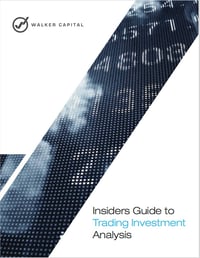According to ASIC’s RG 179.1 a Managed Discretionary Account is defined as, “a facility, other than a registered managed investment scheme (registered scheme) or an interest in a registered scheme with the following features:
(a) a person (MDA client) makes contributions;
(b) the client portfolio assets are managed on an individual basis by another person (MDA provider) at the MDA provider’s discretion, subject to any agreed limitation; and
(c) the client and the MDA provider intend that the MDA provider will use the client portfolio assets to generate a financial return or other benefits for the client”.[1]
Managed Discretionary Account is essentially a portfolio management service in which investors provide funds to an investment manager to manage your portfolio in line with your instructions.
By setting up a Managed Discretionary Account, you are able to remove the constant back and forward between you and the manager when it comes to the buying, selling or applying for investment in a wide range of investment products. So essentially, you are giving your money – or some of it – to someone else to look after.
The key benefits of a Managed Discretionary Account are that you are gaining access to a professional investment manager with extensive access to research and expert stock selection, which ultimately includes their active management of your account on a daily basis, responding proactively to market changes, although for yourself it’s actually a ‘passive investment’.
In addition, your Managed Discretionary Account can have a high degree of flexibility and tailoring to your specific investment strategy and or needs, including your risk tolerance rather than your money being merely thrown into a fund along with all the other investors pooled money.
In this way, Managed Discretionary Accounts are different from managed funds and provide greater transparency – through portals and individual correspondents - as to what the investors’ money is doing and when.
[1] http://download.asic.gov.au/media/4028003/rg179-published-29-september-2016.pdf
Managed by ASIC under the Regulatory Guide 179: Managed Discretionary Accounts, there are strict rules and regulations that govern the setting up and running of these accounts for retail clients.
In terms of the licencing that is required by the managers of Managed Discretionary Account, unless the MDA service provider utilises the services of an external MDA adviser or is a market participant providing an MDA to a family member only, most MDA providers have to obtain an Australian Financial Services Licence to provide their service by 1 October 2017.

Their licence must also include authorisations to deal in all the financial products acquired and traded within the client’s portfolio.[1]
That means that not only are the managers of Managed Discretionary Accounts governed by ASIC, but they are required to be licenced and qualified to do so.[1] https://hub.financialeducation.com.au/managed-discretionary-accounts
According to ASIC’s RG 179.1 a Managed Discretionary Account is defined as, “a facility, other than a registered managed investment scheme (registered scheme) or an interest in a registered scheme
According to a financial adviser and co-founder of Plenary Wealth Julian Nowland, “Using managed accounts has allowed us to switch the client communication on investments from being an admin and paperwork focus into a marketing and education strategy”.
Nowland continues, “instead of requesting information from clients to fill out forms or getting permission to buy this and sell that, we can focus on education, keeping clients updated on changes being made to the MDA, why it has happened and how that relates back to client’s lifestyle outcomes.”[1]
By reducing the amount of paperwork and the authority to execute buys, sells and applications for financial instruments within the agreed guidelines, managers are provided with far more flexibility to act and capitalise upon opportunities as they arise – often in a time critical manner.
If the account was ‘non-discretionary’, the advisor would require a range of authority and paperwork to be completed to transact the trade. This also assumes that the client was available at any given moment to speak with the advisor.

As such, Managed Discretionary Accounts are ideal for people who are busy or people that don’t have the time or skills to be involved in the ‘active portfolio management’, but rather prefer a balanced approach to their investment strategy having a long-term view[2].
In addition, should the client be travelling or on a different time zone, Managed Discretionary Accounts can provide solutions which allows them to be essentially passive to their portfolio management, while their advisor makes their money work for them.
With usually a minimum $250,000 minimum investment requirement, they are again suited for the sophisticated investor and those who meet the investment requirement.
[1] https://www.ifa.com.au/strategy/17656-why-managed-accounts-are-booming
[2] https://biv.com/article/2011/12/weighing-the-pros-and-cons-of-discretionary-invest
When looking to invest money into a Managed Discretionary Account, there are a range of key elements that you should always look for when assessing the viability of a manager for your account. Firstly, you want a manager who has knowledge around not just securities, but also a wide range of derivatives, managed investments, foreign exchange, margin lending and alternative investment strategies.
Having a Managed Discretionary Account manager who is well versed in a wide variety of investment options will provide you with the most holistic portfolio options and opportunities, which is always a benefit for any portfolio. In addition to this, ensure the chosen advisor is on the Financial Advisors register and are compliant with RG146.
When looking to invest money into a Managed Discretionary Account, there is a range of key elements that you should always look for when assessing the viability of a manager for your account. Firstly, you want a manager who has knowledge around not just securities, but also a wide range of derivatives, managed investments, foreign exchange, margin lending and alternative investment strategies.

As such, this technology is seen not only to increase efficiencies but also in transparency and accountability.
Growth in Managed Discretionary Accounts has been driven by several factors, including:
Through Managed Discretionary Accounts, investors are able to be more connected to their investments thanks to technology and have more visibility and accountability, while the account managers are able to have the authority and flexibility to act as the opportunities arise to maximise the growth potential of the portfolio.
Unlike many funds, in a Managed Discretionary Account, the investments and cash are all held in your name, on your HIN rather than on the managers or the fund itself. As the owner of the Managed Discretionary Account, you can always log in to review the exact composition and value of the portfolio at any time through online platforms, providing the ultimate in transparency.
In addition, Managed Discretionary Accounts are far simpler to manage come tax time, as all the investments are held by you, without other people moving in and out of the fund, potentially impacting your capital gains tax each financial year[2].
However, as with any financial service or investment, there are risks that need to be assessed and managed. As the entry requirement to most Managed Discretionary Accounts is usually high, as such are the barriers to entry, the product is not for every investor.

While the fund may provide the manager with the flexibility to act within your strategy, providing you as the investor with limit protections, your Managed Discretionary Accounts are only as good and proactive as the person managing them.
The size, make-up and strategy you employ in your Managed Discretionary Accounts, like all investments, will be subject to market volatility, company, sector and industry risks. When dealing with overseas markets or currency, it should always be assumed that foreign exchange risks will apply and have a bearing on the gains/losses.
When using leveraged products, such as CFD’s (contracts for difference) or leveraged loans or positions to amplify the position that the Managed Discretionary Account manager may employ or wish to hold, it should be noted that your position may require additional capital that exceeds the amount available in the fund, should the investment go against your position. Participation in leveraged products should it be part of your investment strategy taken with caution.
With all of the potential benefits that Managed Discretionary Accounts offer to investors, there are risks, but like any good hedge, they can be managed with due diligence and ensuring that your account manager is suitability qualified and experienced to meet the needs of your investment goals.
[1] https://cuffelinks.com.au/four-drivers-growth-managed-accounts/
1. Schedule an appointment (Conference Call) with an Investment Manager
2. Submit a Managed Discretionary Account (MDA) application with Walker Capital Australia.
3. Open a trading account with the Walker Capital Australia’s executing broker.
4. Select from our range of investment strategies and choose your asset allocation between the choices of accounts.
5. Once all accounts are opened, and funds have been chosen, our team gets to work and begins trading.
Walker Capital Disclaimer *
Walker Capital Private Wealth Pty Limited (ABN 86 161 363 097) holds an Australian Financial Services Licence (AFSL No. 436859). You should read and consider the relevant Disclosure Document and the issuer's Terms and Conditions before making a decision about whether to purchase any financial products.
Walker Consulting (Australia) Proprietary Limited t/as Walker Capital Australia (ACN: 602952116) is a Corporate Authorised Representative (CAR No. 1250196) of Walker Capital Private Wealth Pty Limited (ACN 161 363 097) (AFSL no. 436859)
© Copyright 2022 Walker Capital – All Right Reserved